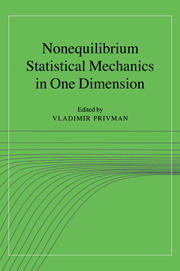Book contents
- Frontmatter
- Contents
- Contributors
- Preface
- Part I Reaction-Diffusion Systems and Models of Catalysis
- Part II Kinetic Ising Models
- Part III Ordering, Coagulation, Phase Separation
- Part IV Random Adsorption and Relaxation Processes
- 10 Random and cooperative sequential adsorption: exactly solvable models on 1D lattices, continuum limits, and 2D extensions
- 11 Lattice models of irreversible adsorption and diffusion
- 12 Deposition-evaporation dynamics: jamming, conservation laws, and dynamical diversity
- Part V Fluctuations in Particle and Surface Systems
- Part VI Diffusion and Transport in One Dimension
- Part VII Experimental Results
- Index
- Abbreviations
11 - Lattice models of irreversible adsorption and diffusion
Published online by Cambridge University Press: 18 December 2009
- Frontmatter
- Contents
- Contributors
- Preface
- Part I Reaction-Diffusion Systems and Models of Catalysis
- Part II Kinetic Ising Models
- Part III Ordering, Coagulation, Phase Separation
- Part IV Random Adsorption and Relaxation Processes
- 10 Random and cooperative sequential adsorption: exactly solvable models on 1D lattices, continuum limits, and 2D extensions
- 11 Lattice models of irreversible adsorption and diffusion
- 12 Deposition-evaporation dynamics: jamming, conservation laws, and dynamical diversity
- Part V Fluctuations in Particle and Surface Systems
- Part VI Diffusion and Transport in One Dimension
- Part VII Experimental Results
- Index
- Abbreviations
Summary
Introduction
In many experiments on the adhesion of colloidal particles and proteins on substrates, the relaxation time scales are much longer than the times for the formation of the deposit. Owing to its relevance for the theoretical study of such systems, much attention has been devoted to the problem of irreversible monolayer particle deposition, termed random sequential adsorption (RSA) or the car parking problem; for reviews see. In RSA studies the depositing particles (on randomly chosen sites) are represented by hard-core extended objects; they are not allowed to overlap.
In this chapter, numerical Monte Carlo studies and analytical considerations are reported for 1D and 2D models of multilayer adsorption processes. Deposition without screening is investigated; in certain models the density may actually increase away from the substrate. Analytical studies of the RSA late stage coverage behavior show the crossover from exponential time dependence for the lattice case to the power-law behavior in continuum deposition. In 2D, lattice and continuum simulations rule out some ‘exact’ conjectures for the jamming coverage. For the deposition of dimers on a 1D lattice with diffusional relaxation the limiting coverage (100%) is approached according to the power law; this is preceded, for fast diffusion, by the mean-field crossover regime with intermediate, ∼ 1/t, behavior. In the case of k-mer deposition (k>> 3) with diffusion the void fraction decreases according to the power law t-1/(k-1).
- Type
- Chapter
- Information
- Nonequilibrium Statistical Mechanics in One Dimension , pp. 229 - 246Publisher: Cambridge University PressPrint publication year: 1997



